I’ve developed a passion for Western Australian fiction, this year reading Simone Lazaroo’s The Australian Fiancé, Julienne Van Loon’s Harmless, and the second novels in crime series by David Whish-Wilson and Felicity Young. On my TBR pile, I have Fractured by Dawn Barker and Elemental by Amanda Curtin. I’m also keen to get hold of Sara Foster’s Beneath the Shadows, described by one reviewer as showing ‘a quiet, non-violent mystery can pack a lot of punch’. Dawn, Amanda and Sara are part of a collective of writers in WA, together with Emma Chapman, Natasha Lester and Annabel Smith, who have a monthly discussion via their blogs on a question about the writing life.
I was inspired by their posts on being another author for a day to write my own version. This month, I’m delighted to be their guest blogger as their Writers Ask Writers series considers tools of the trade: What do you need to have around you in order to be able to write? Certain music? Special notebooks? Apps? Books? Pens?
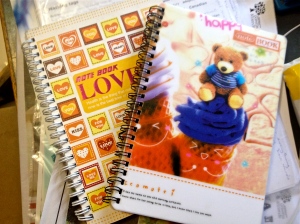 Their questions made me realise that my writing tools are so basic, they’re almost quaint. I write my first draft using a notebook. Not a notebook computer, but a genuine, old school, tree-killing notebook. I write with a pen. Or pencil. Even a texta will do and, at a push, a lip liner. I’m not fussed.
Their questions made me realise that my writing tools are so basic, they’re almost quaint. I write my first draft using a notebook. Not a notebook computer, but a genuine, old school, tree-killing notebook. I write with a pen. Or pencil. Even a texta will do and, at a push, a lip liner. I’m not fussed.
My preferred notebook is the Marbig A5 ‘Colour Hide’, vertical spiral bound with a cardboard pocket at the front. I also love Chinese-made notebooks with nonsensical English phrases on the cover like ‘Health is the thing that makes you feel that now is the best time of the year’ and ‘I know that I’m too young to be in love, but I know that I like you much.’
But if I forget my notebook, I’ll scribble notes on whatever scraps of paper I can find—receipts, envelops, train tickets, business cards.
These simple tools suit my style. I’m not a planner. Writing for me involves a lot of what Marele Day calls ‘research in the imagination’ and Barry Maitland calls ‘mulling’; I think of it as percolating a story. An idea for a snatch of dialogue, a metaphor, a character’s distinguishing feature can come at any moment, and the less rigid my writing needs, the easier it is to capture inspiration when it strikes.
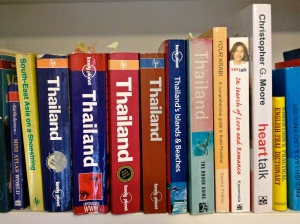 My Jayne Keeney PI crime fiction series are set in Thailand in the late-1990s. Among my essential reference materials are several books on Thai language, and Very Thai by Philip Cornwel-Smith, a guide to everyday popular culture in Thailand. I rely on old travel guides to help me recreate the period, as well as journals I’ve kept of the years when I’ve lived in or travelled to Thailand.
My Jayne Keeney PI crime fiction series are set in Thailand in the late-1990s. Among my essential reference materials are several books on Thai language, and Very Thai by Philip Cornwel-Smith, a guide to everyday popular culture in Thailand. I rely on old travel guides to help me recreate the period, as well as journals I’ve kept of the years when I’ve lived in or travelled to Thailand.
Of course, I’m not so old school that I don’t do online research. I transfer my handwritten notes on to my Macbook Pro (aka ‘The Preciousss’) and use the internet to check facts, maps and geographic features.
But secondary sources only ever get you so far, and in my experience, to make a setting come alive, you need to do fieldwork. This leads me to my other important tool of the trade: my passport.
I’ve posted here, here and here about the value of scouting locations for my stories. That my commitment to fieldwork requires me to spend time in exotic tropical destinations is just one of many ways I suffer for my art.
 Now read about what these other authors say about their tools of the trade:
Now read about what these other authors say about their tools of the trade:
‘One of the best things about writing is that it doesn’t require many tools,’ writes Dawn Barker, before making want to go out in search of the Oxford American Writer’s Thesaurus.
Emma Chapman‘s tools of the trade help her focus and include an intriguing ‘inspiration board’…
Amanda Curtin loves all forms of stationery, though not as much as her late cat Daisy, who ‘once famously ate all the post-it notes off the side of a manuscript.’
Sara Foster‘s writer’s toolbox turns out to be more extensive than she first imagined. I concur with her on the writer’s most precious tool of all.
Natasha Lester‘s enthusiasm for the writer’s software Scrivener borders on evangelical, though she also pines for a waterproof notebook for those ideas that come in the shower.
Annabel Smith shares my love of note taking. Using the kind of notebooks favoured by Hemingway makes her feel ‘part of a great and noble tradition’, though I wonder what Hemingway would make of her other tools like Evernote and Scrivener.
Collectively, these writers go through a hell of a lot of herbal tea and Lindt chocolate.
What about you? Are there certain things you need to have around you in order to write — or to read for that matter? What are your tools of the trade?

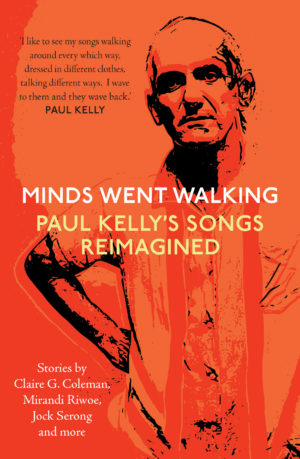
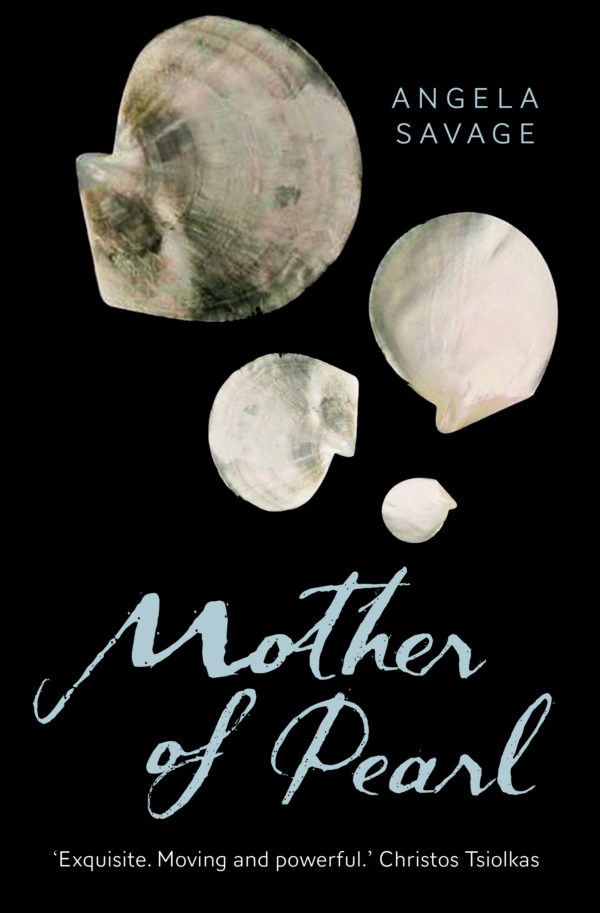
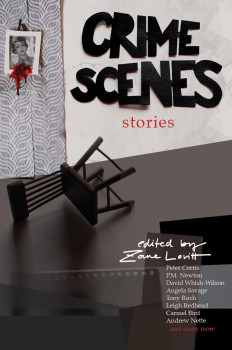



Pingback: Writers ask writers: tools of the trade | looking up/looking down
Pingback: Writers Ask Writers: What Tools Do You Need to Help You Write? | While the kids are sleeping
I love that you call your Macbook ‘the preciousssss’ – I feel the same about my iPhone – there’s something about the gorgeous design that inspires an unhealthy co-dependence, isn’t there?!
LikeLike
It’s partly the design, Annabel. But it’s also efficiency I find so sexy!
LikeLike
If only men understood that efficiency was sexy!
LikeLike
Sing it loud, sister!
LikeLike
Any plans to have Jayne Keeney visit another country in the next book so you get to travel to another exotic location for research?!
LikeLike
Great scheme. That’s why I’ve set my next book in Chile!
LikeLike
Nice one!
LikeLike
Funny you should mention it, Natasha: not quite another country but a part of Thailand that I’m keen to visit…
LikeLike
I have a similar relationship with my Mac 🙂 And I wish I didn’t use up so many trees. Do you remember the dream of the paperless office?
LikeLike
Actually getting close a paperless office at the day job, culling filing cabinets at a rate of knots, at the same time installing more bookshelves at home.
LikeLike
Oh, good for you. I find culling excruciatingly difficult!
LikeLike
Angela – Thanks for sharing your writing life. I couldn’t agree more about research to keep one’s stories authentic. I do the same thing to capture the place I write about most often. I think that’s why your novels have such a real sense of authenticity about them.
LikeLike
Thanks for those kind remarks, Margot. But tell me, what are your tools of the trade? Do you have materials/talismans that make writing easier?
LikeLike
Angela, it’s not real flash, but I have my writing room just about the way I want it. A clear desk with a sheet of red linen thrown over it, a laptop sitting on some bricks, a table whose legs are sitting on some bricks, a crappy bentwood chair with a lumpy pillow, a memento mori, my most essential writing tool – a 24mg e-cigarette with a battery charger plugged into the laptop, a pot of coffee, usually black and cold, a few pencils and some blank paper, and just as important as all of the rest – a couch to crash onto.
Without the couch, none of the rest would matter…
LikeLike
Hah! Dave, you are Marele Day have couches in common. In If I Tell You, I’ll Have To Kill You, Day calls her couch ‘the work station for the first draft’: ‘To the casual eye it appears as if I’m having a rest when on the couch, but in fact this is where the invisible work takes place…doing research in the imagination.’
Is that how couch time works for you?
Sadly, I don’t have a couch in my writing room. But I do have a laptop sitting on a phone book, and a collection of Thai Buddhas signifying days of the week watching over me from a shelf above my desk.
LikeLike
I don’t write crime fiction. I just devour mysteries written by good writers — and love it.
However, I do write some stories about news, like budget cuts, health care, women’s rights, including to medical care and more.
I write at my computer, after reading way too many articles and blog posts. I take voluminous notes, which I type up. Then I write and cut as I go, trimming merrily away.
I keep files of my resources — and after this pile gets ridiculous, I throw out old articles.
Someday, although not in this century, I’ll become a paper-free person, but not any time soon.
LikeLike
Even though we’ve yet to meet in person, Kathy, somehow I can’t picture you as a paper-free person, any more than I can picture myself in such a state 😉
LikeLike
Angela, you mentioned scribbling on scraps of paper. I remember, a professor in my journalism class advised us to carry scraps of paper in our shirt pockets so that we could take notes the moment we thought of something interesting, or creative. I never heeded his advice.
LikeLike
Prashant, despite being a published author for nearly 10 years, there are still times when I struggle to find something to write on — or more pertinently, to write with. As Margaret Atwood once observed, if nothing else, you can always write on your arm, though this is difficult without a pen, or lip liner: scratching it in makes editing a real pain 😉
LikeLike
You’re right on the button, Angela. I am neither a paper-free nor book-free person. I do, however, have slews of two-drawer file cabinets — and worship them and file folders…my salvation.
I have too much of everything, true.
Luckily, some friends who were doing a yard sale about four years ago got five big bags of clothes, shoes and kitchenware. But still, a ridiculous amount of stuff.
However, I do believe in organization, not messes, so there’s at least that to keep it from being a
disaster here.
On to writing with whatever toold one needs.
LikeLike
Pingback: EMMA CHAPMAN » WRITERS ASK WRITERS: Tools of the Trade
that is good Advice for Shower Note Pad.Shower Note Pad is so good.
LikeLike
Pingback: Natasha Lester: while the kids are sleeping | Writers Ask Writers: What Tools Do You Need to Help You Write?
Pingback: Writers Ask Writers: Tools of the Trade | How To Be A Good Wife
Pingback: Bloggers – all | Very Thai
Pingback: Angela Savage: Writers Ask Writers | Very Thai